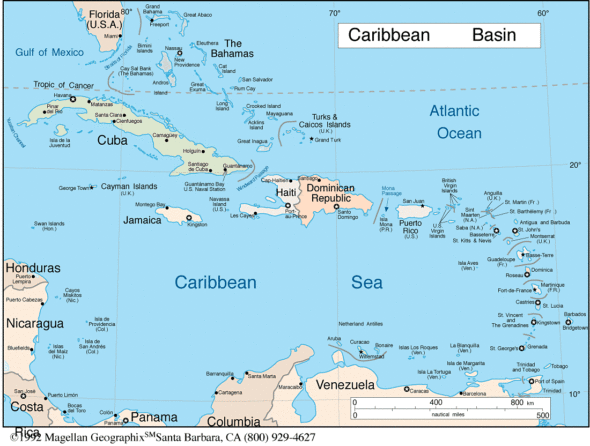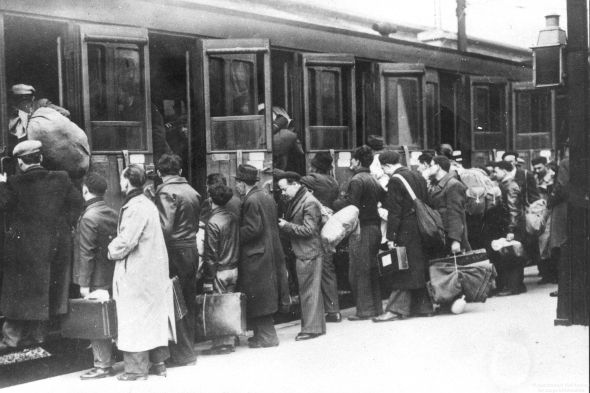News from Bahamas, Germany and France
Tuesday's World Events — Posted on December 9, 2014
 BAHAMAS – Bahamas fends off critics over new migrant rules
BAHAMAS – Bahamas fends off critics over new migrant rules
NASSAU, Bahamas — On the first day new immigration rules took effect [in November] in the Bahamas, officers in green fatigues swept through poor sections of the capital filling two yellow school buses with dozens of people who couldn’t document their right to be in the island chain.
The government, amid fierce criticism of the raid, later insisted the timing of the operation was coincidence. Still, the message of the surprise morning raid, in which the officers were accompanied by local media, couldn’t be clearer: [immigration laws will be enforced].
“The fact is that illegal migration is a huge problem for us,” Foreign Minister Fred Mitchell said in a recent interview. “We spend enormous resources for it. It is a drain on our social services, health care and education and we need to get the matter under control.”
The island chain of about 360,000 has a foreign-born population of more than 18 percent, according to an official report released last month. While the precise number of those who migrated illegally is unclear, the islands long have drawn migrants sailing from nearby Haiti. Census figures from 2010 show more than one out of 10 people in the Bahamas is Haitian, up from 3.6 percent in 1970.
Mitchell said haphazard enforcement of existing laws has put too many people in legal limbo and has made the Bahamas a magnet for migrants, arriving often in dangerously overloaded smuggling vessels. …..
The government says it’s working to reduce the population in the detention center and sent two planeloads of migrants to Haiti on Wednesday. “In the Bahamas, they treat Haitians like dogs,” Youtchike Dormeus, an 18-year-old deportee, said as she got off the plane in Port-au-Prince. The country, which denies treating anyone inhumanely, has deported 3,000 people this year.
Under the new rules that took effect Nov. 1, everyone must have the passport of their nationality and, if they are not a Bahamian, a valid residency or work stamp. In addition, the government is tightening the process for employers to receive work permits for non-Bahamians and requiring first-time applicants for residency permits to apply in their home countries.
Mitchell says the Bahamas briefed Haiti’s government before the new rules took affect and was assured it could provide the passports and other documents needed by Haitians. He has defended the new policies in blunt terms. “You can’t just jump off a boat with your wet feet and come into the immigration department and apply for a work permit,” he told Parliament.
The situation in the Bahamas has brought condemnation from Amnesty International and the Robert F. Kennedy Center for Justice and Human Rights. Daphne Campbell, a Florida state representative of Haitian descent, has called for a boycott of the Bahamas.
Government officials say the new restrictions remain popular among Bahamian citizens. “It’s becoming a national security issue for us and for our neighbors and we have to do something about it,” Mitchell said.
NOTE: The Bahamas became an independent Commonwealth realm in 1973, retaining Queen Elizabeth II as its monarch. In terms of gross domestic product per capita, the Bahamas is one of the richest countries in the Americas (following the United States and Canada). Its economy is based on tourism and finance.
GERMANY – Far-Left party wins state parliament
Germany’s far-Left party has returned to power in a state government for the first time since the Berlin Wall fell 25 years ago, stoking heated debate about its communist roots. [NOTE: Germany is made up of sixteen states. Since Germany has a federal constitution, the constituent states retain a measure of sovereignty.]
The Left Party, widely seen as the successor to the Socialist Unity Party (SED) that once ruled East Germany, will head the government of Thuringia after the state parliament narrowly voted to approve a new coalition.
The new state prime minister, Bodo Ramelow, used his first speech in parliament to apologise to victims of the former communist regime, and said he wanted to “reconcile rather than divide.”
Thousands of people braved sub-zero temperatures on the streets of the state capital, Erfurt, on Thursday night (Dec. 4) to protest against the expected result of the vote.
German Chancellor Angela Merkel predicted the decision would be “bad news” for Thuringia, while the German President, Joachim Gauck, broke with the traditional neutrality of his role to speak out against it.
But the state parliament voted to approve Mr. Ramelow’s three-way coalition after the Social Democrat party, Mrs. Merkel’s partner in the federal government, rejected an alliance with her Christian Democrat party in the state.
The coalition, which is completed by the Green Party, will have a majority of just one seat in the state parliament.
Although Mr. Ramelow grew up in West Germany, many of the Left Party’s leadership were senior figures in the East German communist party and some have been accused of links with the Stasi secret police.
Thuringia was part of East Germany until reunification, and many have expressed dismay at the former communists’ return to power.
“Old SED [Socialist Unity Party] comrades and Stasi informers run the state now,” said Rainer Wagner, chairman of the Union of Victims’ Associations of Communist Tyranny.

Bodo Ramelow was sworn in as Thuringia state prime minister on Friday.
“Many who were in prison in [East Germany] are very upset,” the director of the Stasi memorial in Berlin, Hubertus Knabe, told Nord-West Zeitung newspaper. “They feel that the lessons of history have been forgotten.”
Mrs. Merkel’s spokesman issued a terse statement: “It is government practice that the Chancellor sends each elected [state] prime minister her congratulations, and that, of course, is what she does in this case.”
FRANCE – Government agrees to compensate Holocaust deportees
PARIS — Thousands of Holocaust survivors and family members in the United States and elsewhere will be entitled to compensation from a $60 million French-U.S. fund announced Friday – reparations to those deported by France’s state rail company SNCF during the Nazi occupation of France.

Paris, France, Jews getting on a deportation train bound for a detention camp, May 14, 1941.
As part of the deal, the U.S. government will work to end lawsuits and other compensation claims in U.S. courts against SNCF, which is bidding for lucrative high-speed rail and other contracts in U.S. markets. State legislators in Maryland, New York, Florida and California have tried to punish SNCF for its Holocaust-era actions.
“This is another measure of justice for the harms of one of history’s darkest eras,” said the U.S. Special Adviser on Holocaust Issues, Stuart Eizenstat, who spent three years working with French officials on the agreement.
SNCF transported about 76,000 French Jews to Nazi concentration camps, though experts disagree on its degree of guilt. SNCF has expressed regret for what happened, but argues it had no effective control over operations during the Nazi occupation from 1940 to 1944.
The compensation fund will be financed by the French government and managed by the United States. The accord will be signed Monday in Washington, but it still must get approval from the French Parliament, which could take months.
France’s government has already paid more than $6 billion in reparations, but only to French citizens and certain deportees. The new accord is to help compensate Americans, Israelis and some others who were not eligible for other French reparations programs.
 Patrizianna Sparacino-Thiellay, a French ambassador for human rights who worked closely with Eizenstat on the accord, said “hundreds” of people in the U.S. are eligible under the new fund as direct survivors or spouses, and several thousand could be eligible as heirs.
Patrizianna Sparacino-Thiellay, a French ambassador for human rights who worked closely with Eizenstat on the accord, said “hundreds” of people in the U.S. are eligible under the new fund as direct survivors or spouses, and several thousand could be eligible as heirs.
The money should break down to about $100,000 each for survivors and tens of thousands of dollars for spouses, said Eizenstat.
Only in 1995 did France acknowledge a direct role in the Holocaust, when then-President Jacques Chirac said the state bore responsibility. Subsequent compensation programs paid out compensation worth hundreds of millions of dollars.
The German government has paid around 70 billion euros ($85 billion) in compensation for Nazi crimes, mainly to Jewish survivors.
France already has international accords with four countries – Poland, Belgium, Britain and the Czech Republic – over compensation for deportation victims. Friday’s deal aims to fill the remaining gaps in justice for others also affected.
Although SNCF is not a party to the agreement, the company will contribute $4 million over the next five years to fund Holocaust memorials and museums in the U.S., Israel and France, according to Eizenstat. …
Patrizianna Sparacino-Thiellay said the French government wanted to finish the deal by year-end in part for symbolic reasons: France is hosting several events marking 70 years since the Allies liberated France from the Nazis in 1944. …..
The deal comes as France, home to western Europe’s largest Jewish community, is facing new concerns about anti-Semitism. France’s leading Jewish organization, CRIF, estimates that the number of anti-Semitic incidents has grown 91 percent this year compared to a year ago.
(The news briefs above are from wire reports and staff reports posted at YahooNews 0n Nov. 27, London’s Daily Telegraph and Washington Times on Dec. 5.)
Background
GERMANY - EAST GERMAN SECRET POLICE (STASI):
- The Stasi were the official secret police of East Germany.
- As the most comprehensive internal security organization of the Cold War, it was the most effective, and repressive, intelligence and secret police agencies in the world.
- Founded by the Soviets in 1947 and reorganized in 1950, the Stasi’s motto was Schild und Schwert der Partei (“Shield and Sword of the Party”).
- The Stasi was much larger in East Germany than the Gestapo had been in the Nazi state.
- Like its Soviet model, the Stasi constituted a secret police force, a secret intelligence agency, and an official investigative organ.
- The Stasi systematically infiltrated every part of society, and used hundreds of thousands of secret informers to ensure that ideas [against the government] were immediately identified and rooted out.
- No one trusted anyone outside their family. The Stasi controlled a widespread network of informants, and out of a population of 16 million it is estimated that 400,000 people were active informants.
- The Stasi maintained files on 6 million of its own citizens, more than 38% of the entire population, and all telephone calls and mail from the West were monitored.
- Stasi operatives routinely collected scent samples (Geruchsproben “smell samples”) from people by wiping cloth over objects they had touched or by breaking into people’s homes and stealing their dirty underwear, the samples then being stored in airtight containers. The scents were then passed to police equipped with sniffer dogs who could pick the individuals out amid a crowd. People were imprisoned and tortured simply for telling political jokes.
- The Stasi was disbanded 5 months after the fall of the Berlin Wall in 1989. (from conservapedia and wikipedia)
